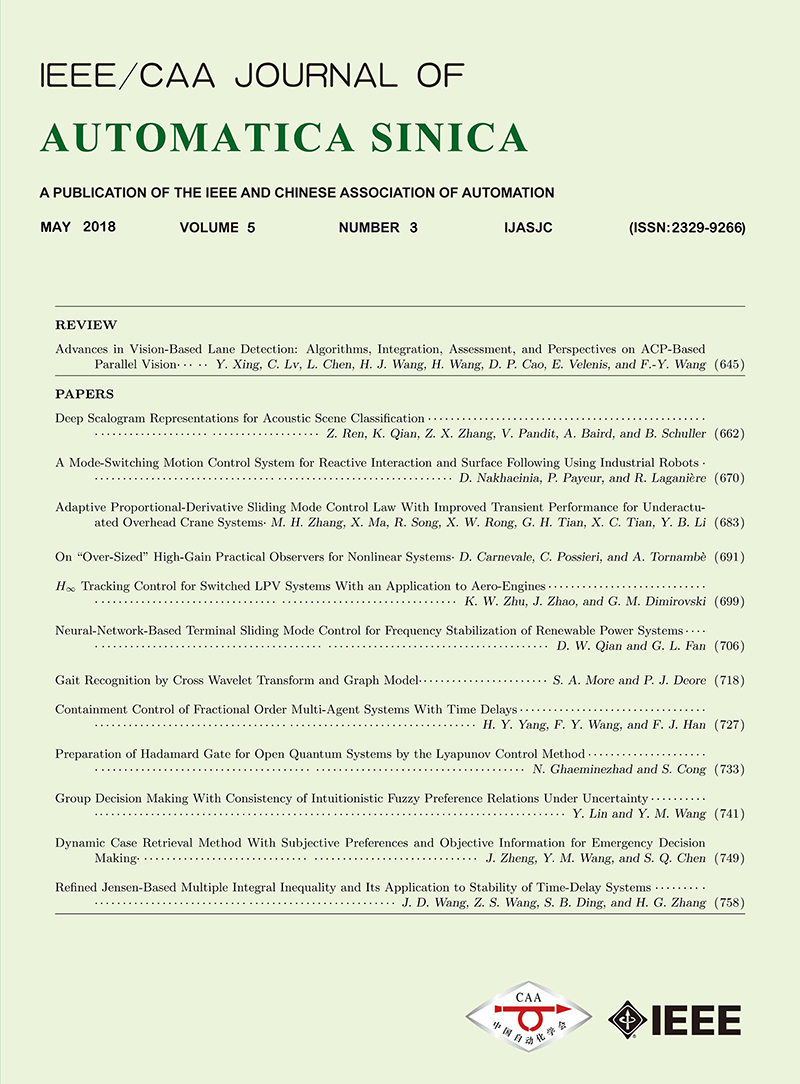 Volume 1
Issue 3
Volume 1
Issue 3
IEEE/CAA Journal of Automatica Sinica
| Citation: | Mark J. Balas and Susan A. Frost, "Robust Adaptive Model Tracking for Distributed Parameter Control of Linear Infinite-dimensional Systems in Hilbert Space," IEEE/CAA J. of Autom. Sinica, vol. 1, no. 3, pp. 294-301, 2014. |

| [1] |
Pazy A. Semigroups of Linear Operators and Applications to Partial Differential Equations. New York: Springer, 1983.
|
| [2] |
D'Alessandro D. Introduction to Quantum Control and Dynamics. London: Chapman & Hall, 2008.
|
| [3] |
Balas M, Erwin R S, Fuentes R. Adaptive control of persistent disturbances for aerospace structures. In: Proceedings of the AIAA Guidance, Navigation and Control Conference. Denver, 2000.
|
| [4] |
Fuentes R J, Balas M J. Direct adaptive rejection of persistent disturbances. Journal of Mathematical Analysis and Applications, 2000, 251(1): 28-39
|
| [5] |
Fuentes R, Balas M. Disturbance accommodation for a class of tracking control systems. In: Proceedings of the AIAA Guidance, Navigation and Control Conference. Denver, Colorado, 2000.
|
| [6] |
Fuentes R J, Balas M J. Robust model reference adaptive control with disturbance rejection. In: Proceedings of the American Control Conference. Anchorage, AK: IEEE, 2002. 4003-4008
|
| [7] |
Balas M, Gajendar S, Robertson L. Adaptive tracking control of linear systems with unknown delays and persistent disturbances (or Who You Callin'Retarded?). In: Proceedings of the AIAA Guidance, Navigation and Control Conference. Chicago, IL, 2009.
|
| [8] |
Wen J T. Time domain and frequency domain conditions for strict positive realness. IEEE Transactions on Automatic Control, 1988, 33(10): 988-992
|
| [9] |
Kato T. Perturbation Theory for Linear Operators. New York: Springer, 1980.
|
| [10] |
Renardy M, Rogers R. An Introduction to Partial Differential Equations. New York: Springer, 1993.
|
| [11] |
Curtain R, Pritchard A. Functional Analysis in Modern Applied Mathematics. Academic: Academic Press, 1977.
|
| [12] |
Balas M J. Trends in large space structure control theory: fondest hopes, wildest Dreams. IEEE Transactions on Automatic Control, 1982, 27(3): 522-535
|
| [13] |
Balas M, Fuentes R. A non-orthogonal projection approach to characterization of almost positive real systems with an application to adaptive control. In: Proceedings of the American Control Conference. Boston, MA, USA: IEEE, 2004. 1911-1916
|
| [14] |
Antsaklis P, Michel A. A Linear Systems Primer. Boston: Birkhauser, 2007.
|
| [15] |
Popov V M. Hyperstability of Control Systems. Berlin: Springer, 1973.
|
| [16] |
Kailath T. Linear Systems. New York: Prentice-Hall, 1998. 448-449
|
| [17] |
Balas M, Frost S. Distributed parameter direct adaptive control using a new version of the Barbalat-Lyapunov stability result in Hilbert space. In: Proceedings of AIAA Guidance, Navigation and Control Conference. Boston, MA: AIAA, 2013.
|
| [18] |
Kothari D, Nagrath I. Modern Power System Analysis. New York: McGraw-Hill, 2003.
|
| [19] |
Cannarsa P, Coron J M, Alabau-Boussouira F, Brockett R, Glass O, Le Rousseau J, Zuazua E. Control of Partial Differential Equations: Cetraro, Italy 2010, Editors: Piermarco Cannarsa, Jean-Michel Coron (Lecture Notes in Mathematics/C.I.M.E. Foundation Subseries). Berlin Heidelberg: Springer, 2012.
|
| [20] |
Troltzsch F. Optimal Control of Partial Differential Equations. Providence, RI: American Mathematical Society, 2010.
|
| [21] |
Smyshlyaev A, Kristic M. Adaptive Control of Parabolic PDEs. Princeton: Princeton University Press, 2010.
|